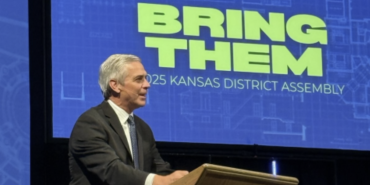Unique Ways of Serving

This summer, Carmen Ringhiser, managing editor of Holiness Today, and I enjoyed the unique privilege of interacting with pastors and leaders from three Church of the Nazarene educational zones at Pastors and Leaders Conferences (PALCONs). We hosted a booth in the exhibit halls and spoke with numerous attendees at the three conferences. Many of them happened to be my former university students. What a time I enjoyed renewing friendships and catching up on the Lord’s work in our lives during the years that had separated us.
Frequently in my conversations with these individuals, I asked them to summarize how they did ministry in unique ways in their particular assignments. My questions focused on getting my pastor and leader friends to consider the ways they did ministry. I wanted them to think beyond the maintenance mode of simply going through the motions of doing ministry to stay in business. Without fail, my friends offered quick responses in telling me about their unique settings. Their responses amazed me; no two were alike.
Each reflected on the personality of the pastor or leader, the particular strengths of the local church fellowship, and the needs of their communities.
You’re going to be hearing some of their ideas in this issue of Holiness Today. Carmen interviewed several of them, took extensive notes from her conversations, and prepared the material for you. Some of the ideas mentioned here will translate directly into your ministry settings. Other ideas may not have a direct application but will give you food for thought about similar efforts you might pursue that can be fruitful in your contexts. I trust you will find these concepts both inspirational and informative as you think of ways to apply them to your own life or in your local church.
Thinking back across the entire group of conversations I had at the three conferences, I realize that they track together along several common themes:
-
These pastors and leaders think for themselves beyond their educational experiences. They continue to learn from the trial and error of ministry experiences as they invest in people and seek to meet needs in practical ways. They blaze new trails of ministry under the leadership of the Holy Spirit.
-
These pastors and leaders heavily invest themselves in discipleship ministries that mentor young people and new believers in the Christian faith. They do this through hands-on experiences in ministry, leading the next generation and new Christians to be involved in reaching out to people in need in Jesus’ name.
-
These pastors and leaders care for both the hearts and the bodies of suffering people.
They provide the means for their local congregations to affect the souls of women and men. Furthermore, they offer services that care for the physical needs of individuals in their communities. This leads to holistic ministry.
-
These pastors and leaders do not simply minister to individuals in order that they might invite them to church or preach a sermon to them. Rather, they reach out to anyone they find to be in need because they want to show them the loving heart of Jesus. This love is winsome and compelling because it flows from God’s heart and draws people to God.
-
One more characteristic I noticed these pastors share—most of them are young and eager to experiment with new forms of ministry.
I have lived long enough to realize that God is always at work in our world doing new things. God does not need for us to develop our own plans for doing ministry without His involvement. Rather, we simply need to allow God’s Spirit to guide us to the new thing He wants to do among us.
As you read through the articles in this issue of Holiness Today, I trust you will be encouraged and inspired by the way God is working to bring needy people to himself. May these articles motivate you to re-double your efforts to bring needy people to God.
Frank M. Moore, editor in chief of Holiness Today.
Please note: All facts, figures, and titles were accurate to the best of our knowledge at the time of original publication but may have since changed.




